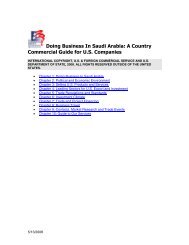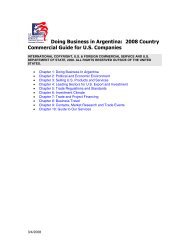Doing Business In (Insert Country Name Here) - BNA
Doing Business In (Insert Country Name Here) - BNA
Doing Business In (Insert Country Name Here) - BNA
You also want an ePaper? Increase the reach of your titles
YUMPU automatically turns print PDFs into web optimized ePapers that Google loves.
Additional information on import/export documentation can be found in Title III, of<br />
Council Regulation (EEC) No. 2913/92 of October 12, 1992, establishing the Community<br />
Customs Code (Articles 37 through 57). Goods brought into the customs territory of the<br />
Community are, from the time of their entry, subject to customs supervision until<br />
customs formalities are completed.<br />
Goods presented to customs are covered by a summary declaration, which is lodged<br />
once the goods have been presented to customs. The customs authorities may,<br />
however, allow a period for lodging the declaration, which cannot be extended beyond<br />
the first working day following the day on which the goods are presented to customs.<br />
The summary declaration can be made on a form corresponding to the model prescribed<br />
by the customs authorities. However, the customs authorities may permit the use, as a<br />
summary declaration, of any commercial or official document that contains the<br />
particulars necessary for identification of the goods. It is encouraged that the summary<br />
declaration be made in computerized form.<br />
The summary declaration is to be lodged by:<br />
• The person who brought the goods into the customs territory of the Community<br />
or by any person who assumes responsibility for carriage of the goods following<br />
such entry; or<br />
• The person in whose name the person referred to above acted.<br />
Non-EU goods presented to customs must be assigned a customs-approved treatment<br />
or use authorized for such non-Community goods. Where goods are covered by a<br />
summary declaration, the formalities for them to be assigned a customs-approved<br />
treatment or use must be carried out:<br />
• 45 days from the date on which the summary declaration is lodged in the case of<br />
goods carried by sea;<br />
• 20 days from the date on which the summary declaration is lodged in the case of<br />
goods carried other than by sea.<br />
Where circumstances so warrant, the customs authorities may set a shorter period or<br />
authorize an extension of the period.<br />
The Modernized Customs Code (MCC) of the European Union is expected to be passed<br />
into law in the first half of 2008. The MCC will replace the existing Regulation 2913/92<br />
and simplify various procedures such as introducing a paperless environment,<br />
centralized clearance, and more. Check the EU’s Customs website periodically for<br />
updates:<br />
[http://ec.europa.eu/taxation_customs/customs/procedural_aspects/general/community_<br />
code/index_en.htm]<br />
Batteries<br />
EU battery rules changed in September 2006 following the publication of the Directive on<br />
batteries and accumulators and waste batteries and accumulators (Directive 2006/66).<br />
This Directive replaces the original Battery Directive of 1991 (Directive 91/157). The<br />
updated Directive applies to all batteries and accumulators put on the EU market<br />
including automotive, industrial and portable batteries. It aims to protect the environment<br />
2/15/2008 <strong>Country</strong> Commercial Guide for France 74<br />
INTERNATIONAL COPYRIGHT, U.S. & FOREIGN COMMERCIAL SERVICE AND U.S. DEPARTMENT OF STATE,<br />
© 2007. ALL RIGHTS RESERVED OUTSIDE OF THE UNITED STATES.












